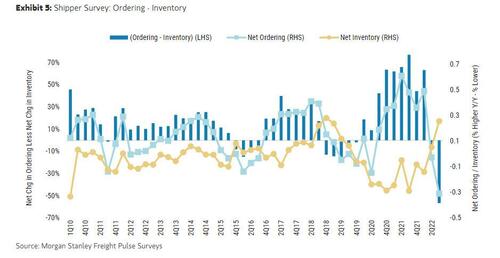Morgan Stanley Says Jaw-Dropping Inventory Levels A “Key Risk” To Retailers
By Rachel Premack of FreightWaves
A Monday report from Morgan Stanley’s equity team (available to pro subs here) said inventory is a “key risk” to retailers and electronic goods manufacturers. Thank skidding demand amid a glut of inventory, i.e. the reverse bullwhip effect we predicted back in May is coming true (see “Bullwhip Effect Ends With A Bang: Why Prices Are About To Fall Off A Cliff“).
Morgan Stanley highlighted retailers like Best Buy, Gap and Williams-Sonoma as most exposed to these inventory risks. In the goods industry, Morgan Stanley said there’s a 19% discrepancy between inventory and sales growth.
Companies with high consumer exposure have slashed their ordering — even though this time of year tends to be when retailers are beefing up their warehouses ahead of the holiday season.
According to the Morgan Stanley Shipper Survey, in which some 100 corporations regularly share their transportation needs and macro expectations, net ordering levels have reached the lowest point in the survey’s 12-year history. Ordering levels are down 40% year over year. Net inventory levels are also unusually high.
“Almost half of respondents say that their inventory is higher and ordering is lower going forward — which firmly indicated an over-inventoried/de-stocking condition,” wrote Ravi Shanker, who is Morgan Stanley’s lead transportation equity analyst.
The 56-page report noted elsewhere:
“Faced with a glut of inventory, companies will need to decide whether they want to accept high costs to continue holding inventory, destroy inventory, keep prices high and take a hit on the number of units sold, or slash prices to stimulate demand. We believe many will turn to aggressive discounting to solve their inventory problem which is likely to spark a ‘race to the bottom’ as companies attempt to cut prices faster than peers and move out as much inventory as possible. This dynamic will weigh heavily on margins and fuel the earnings slowdown we are predicting.”
In other words, precisely what Zero Hedge said would happen.
Analysts highlighted apparel as one sector reporting “alarming” growth in imports. As a result, they boosted Ross, Burlington and T.J. Maxx’s parent company as some of the few retailers who could soar in the present environment, because they can take advantage of other stores looking to shed inventory.
Home furnishings and personal electronics are also at elevated risk.
Some industries are still experiencing supply chain disruptions. Analysts identified machinery, electrical equipment and the automotive industry as facing low to moderate risk from the inventory chaos.
The automotive industry’s slow recovery to pre-pandemic inventory levels is bad news for inflation. New and used vehicle prices make up some 80% of core goods inflation, according to the Morgan Stanley report. On the other hand, Cox Automotive reported that wholesale used-car values declined in September year over year for the first time since May 2020.
The ‘trucking winter’ is coming thanks to high inventory
The finding from Morgan Stanley that retailers and manufacturers are ordering historically low levels of goods provides standing to a report from KeyBanc last week.
KeyBanc noted that slow economic demand may cause transporters to miss out on the normal peak season activity that precedes the winter holidays, sparking a “trucking winter.”
Many retailers appear to have prepared for the holiday season earlier this year, anticipating disruptions in importing goods from manufacturing hubs in East Asia. An unprecedented demand for durable goods in 2020 and 2021 also spurred retailers to stock up, as they anticipated shoppers to keep on shopping.
But, the shopping spree ended.
Now, inventory levels have far outpaced the growth in sales. Behemoths like Target have tried to manage their sky-high inventory levels by canceling inbound shipments. According to U.S. Customs data aggregated by logistics platform Descartes, imports to the U.S. declined by 11% in September compared to the year before. It was the biggest decline in imports since February 2020, when China first locked down in response to the coronavirus pandemic.
Tyler Durden
Thu, 10/13/2022 – 09:10
via ZeroHedge News https://ift.tt/SoQmMgr Tyler Durden
